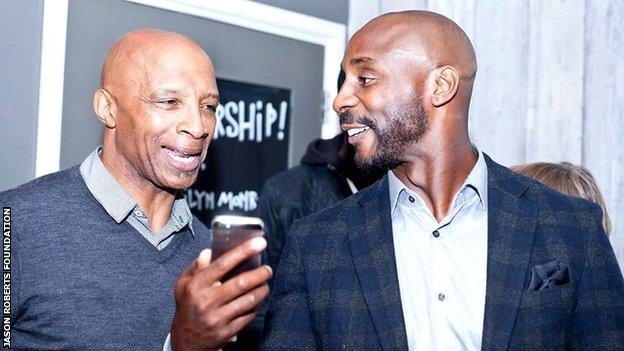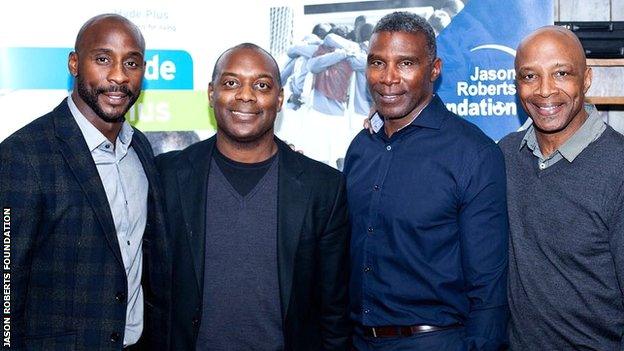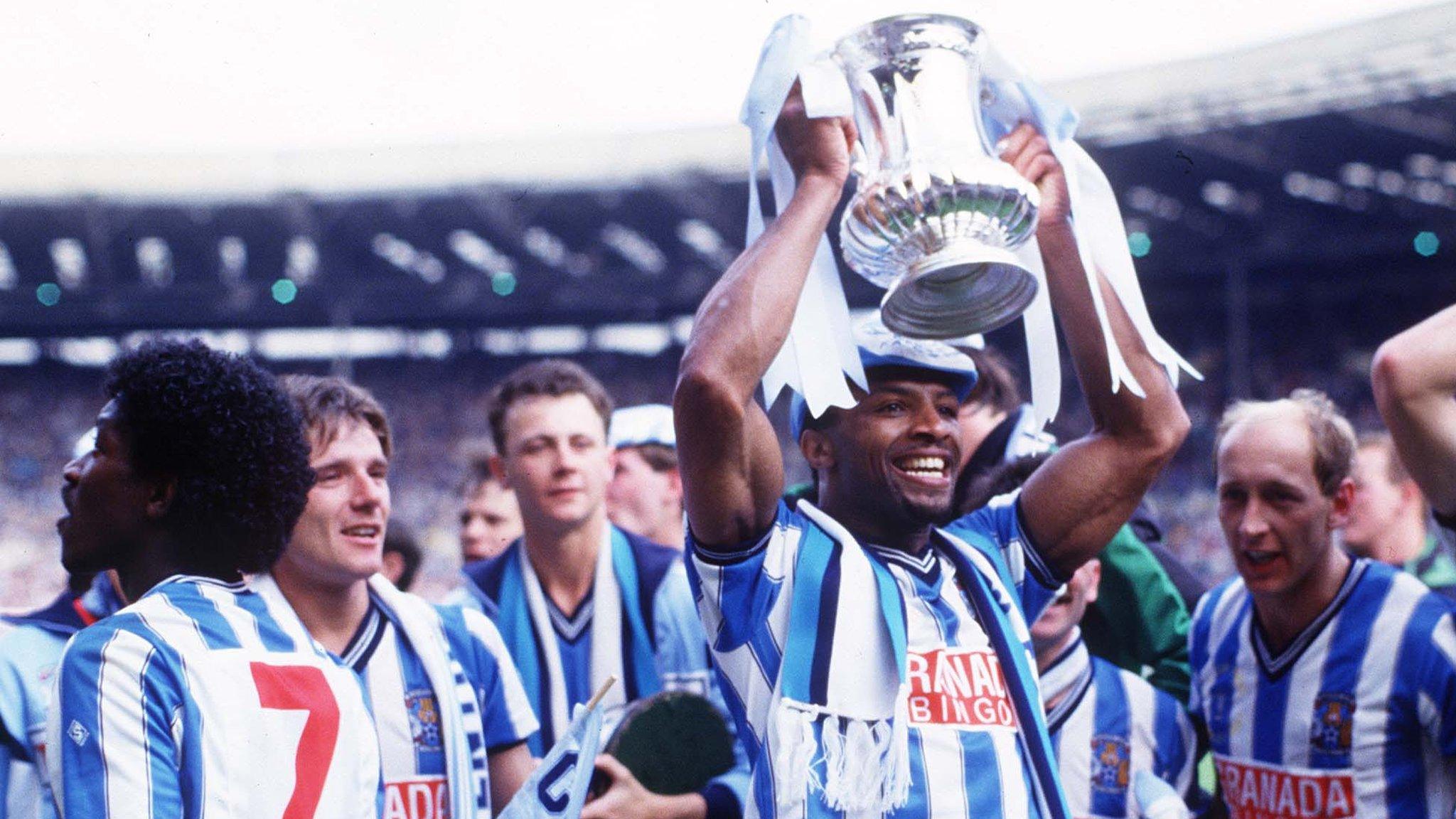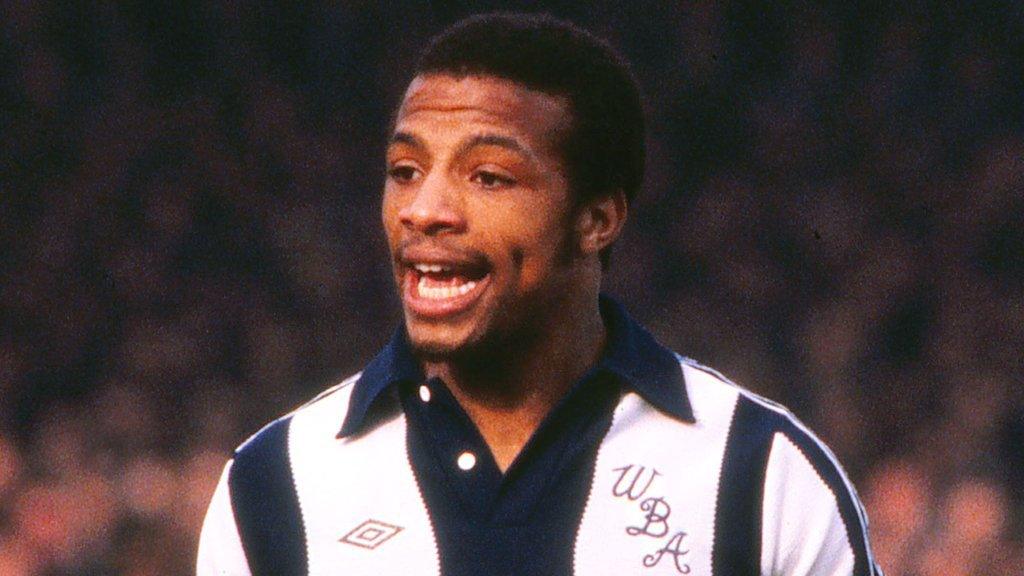Cyrille Regis dies: 'Pioneer to many, but to me he was just my uncle' - Jason Roberts
- Published

Cyrille Regis visited nephew Jason Roberts at his foundation in north London recently
Cyrille Regis, the former West Brom and England forward, has died at the age of 59. He has been described as "one of the great symbols of the fight against racism" and "a pioneer for black footballers" across the world. Here, his nephew, the former West Brom, Blackburn and Wigan striker Jason Roberts, pays his own touching tribute...
Cyrille Regis might have been a hero or a pioneer to many, but to me he was just my uncle.
Growing up as a young kid on the Stonebridge Estate in north London, I never realised what he did was so special. I just thought that all uncles played in the First Division and for England!
He was one of my three football-playing uncles, and when we all went round to my grandparents' house for Sunday dinner, he'd be there at the end of the table. He was no-one special, just one of us.
But there were several moments in my life where it struck me how big a star he was and how much he inspired people. In time, he proved to offer me the same inspiration - and for that I owe him so much.
The first example came when we almost moved to France because of him. Few might remember it but soon after signing for West Brom, he was offered a chance to join French club Saint-Etienne.
It was 1978, and at the time they were a huge team. They had just won three consecutive league titles and two years previously were in the European Cup final.
They wanted to sign Cyrille for £750,000 - which would have been a British transfer record - and there were aims for him to play for France too, as he was born in French Guiana.
The plan was for my mum to go over to France as his translator and I would have joined them. He came close to signing - apparently he had sleepless nights over the decision - but he felt English.
And he went on to be a West Brom and Coventry legend.
The player, the legend
I came to realise how much people were in awe of him when he lived with me and my mum while playing for Wycombe Wanderers a few years later. He stayed with us on the days he was training rather than going back and forth to Birmingham.
As I grew older and more aware, I just remember being very proud; proud that it was my uncle out on the pitch scoring those wonderful goals, proud that he was taking on the racists, and then just having time for his nephew.
I also recall getting the sense that his impact was bigger than football.
Every time I played football in the school playground, everyone wanted to be Cyrille Regis. At that difficult time, he showed there was a place for us in the game. He made us believe in ourselves, so how many others did he influence?
If uncle Cyrille could make it then why couldn't we?
Don't get me wrong, he was a big man, but when he went out on the pitch it's like he grew another five feet.
I heard all the stories about how he used to terrorise defences. He was so direct, so powerful and so exciting. His style of play stood out and not many could play in that fashion on a consistent basis.
Brian Deane breaks down during Cyrille Regis tribute
How Cyrille shaped me
I learned a lot more about him when I signed for West Brom myself in 2000, for a then club record fee of £2m.
By then, Cyrille was my agent and came down to the unveiling at The Hawthorns, but the fans were more interested in getting his autograph than mine.
It made me laugh and was a recognition of how iconic he was at the club.
In public he was the star of the show, but it started to feel normal after a while. He was always so calm, measured and respectful - in many ways the opposite of me - and to do that after the sort of abuse he suffered shows the kind of man he was.
All of the bad decisions in my career were mine; all of the good ones were his. He used to tell me: "You can't say that to the manager. You can't just turn up and do as you please."
But it was never a player-agent relationship with me and him, it was just my uncle Cyrille advising me.
That went right back to the start when I was released by Chelsea at the age of 16 and I fell out of love with football.
Cyrille was the person that picked me up again and he got me a trial at Hayes FC by convincing the coach Alan Christopher to give me a go. He always encouraged me to play at any level because you never know what might happen. How sage that advice was.
Hayes was where he started his career and playing men's football at 18 gave him a chance to showcase his talent. It proved the same for me - after that I got a move to Wolves.
More importantly, I knew my uncle would always be on the end of the phone for anything offering his calm reassuring advice. I was very fortunate.

Jason Roberts with his three uncles, including Cyrille (far right), last week
Cyrille's legacy
Cyrille understood his impact on the community and on social issues, but he never sought to gain benefit from it. It was just what he did and who he was - and that has left a lasting impact on me.
As a trustee of The Jason Roberts Foundation, he would often come back to The Pavilion in Stonebridge Estate where we grew up. He was there last week meeting people from the community and the young people who use the facilities.
There's no chance I would have had the belief in myself without Cyrille - from the inspiration of playing the game, to feeling there was a place for me in football, to having the belief that my ability could take me as far as I wanted to go.
To have him sit next to me to guide me through my career, my life and my transition out of the game - and he did it all just as my uncle - it doesn't get any better than that.
My family have been completely overwhelmed by the love and messages from everyone since his passing.
As he was to many people, he was our hero. But to me he was just my uncle.
We stood on Regis' shoulders - Dublin
- Published15 January 2018

- Published15 January 2018
